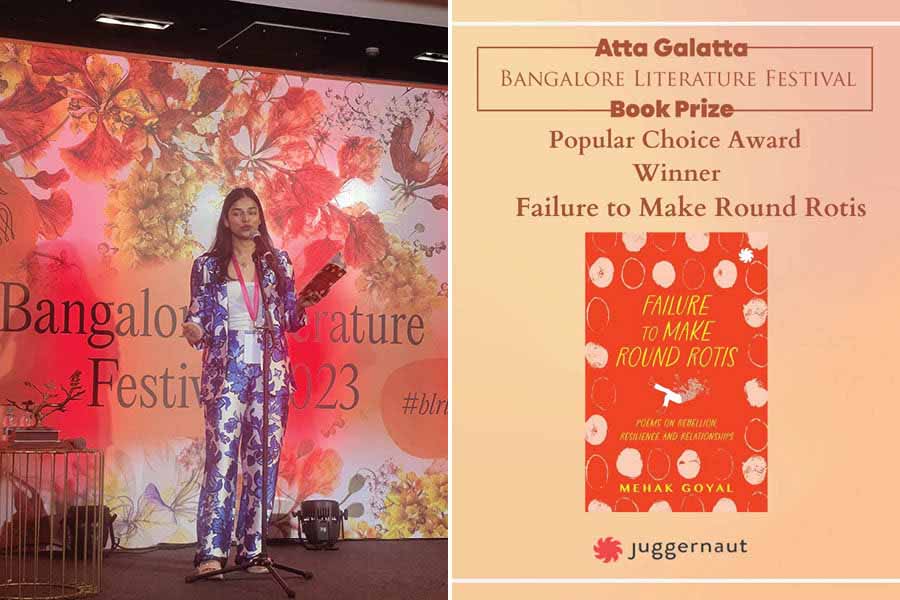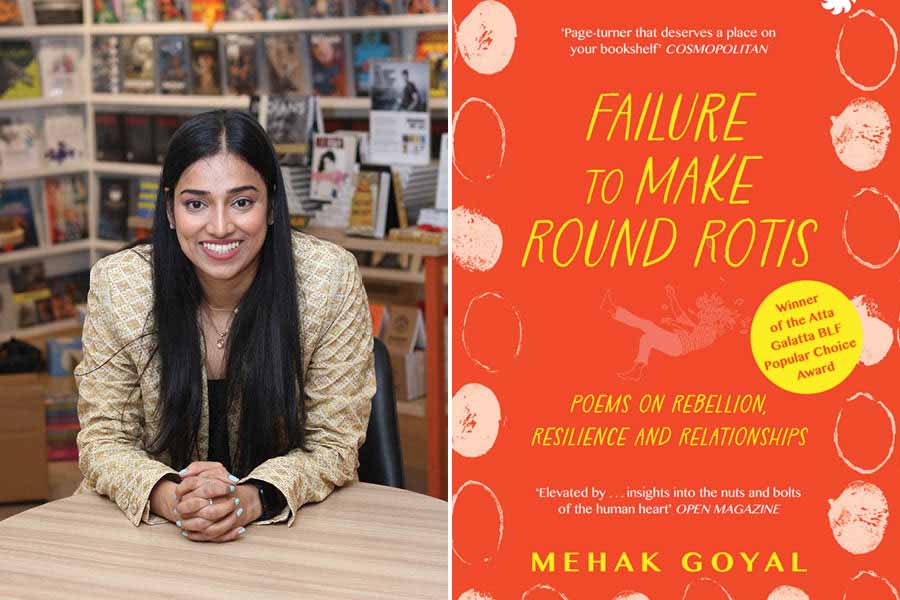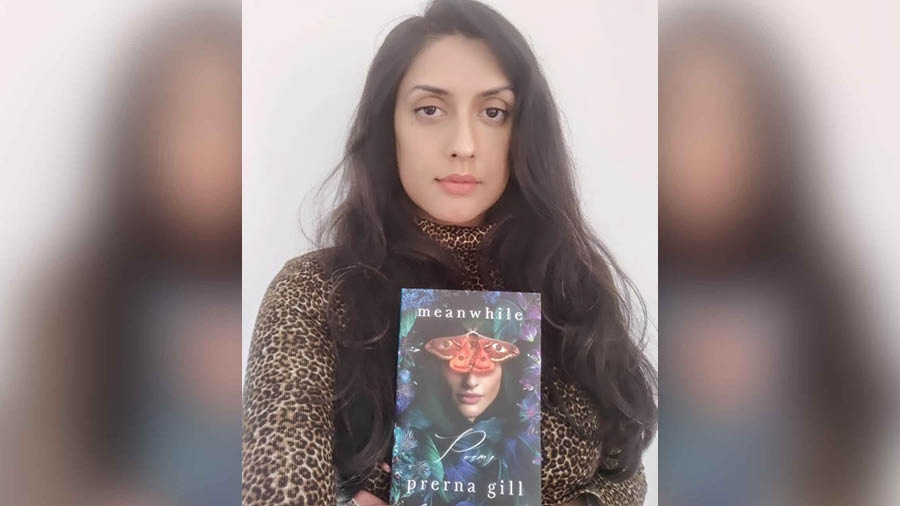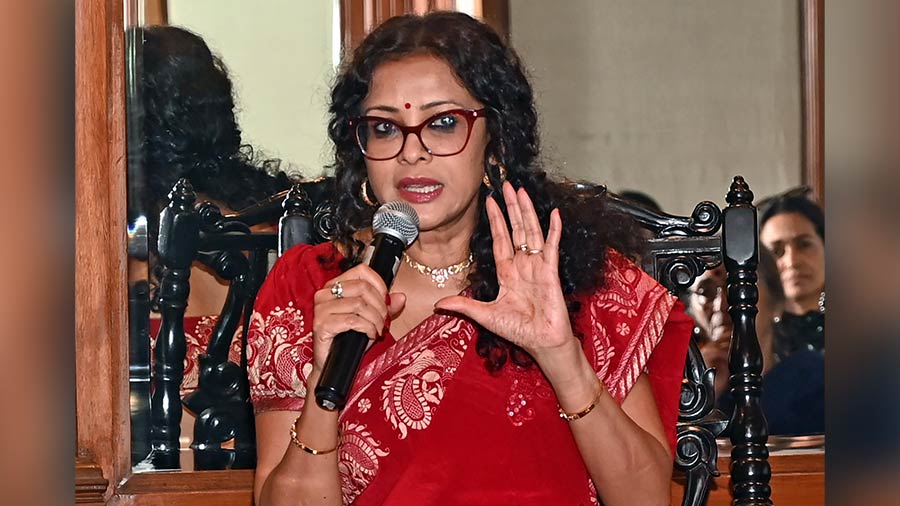It was on the sidelines of a literary meet that Mehak Goyal handed over a copy of her book of poems to me. Deeply sceptical of the ‘social media’ breed of poets, I took the book home and promptly forgot about it. Till one night, as sleep eluded me, I found this peeking from behind a pile of books I often have next to my pillow. I opened the book, and began flipping over a few pages almost desultorily, willing myself to close my eyes. If I was looking for poetry to lull me to sleep, I was pleasantly and happily mistaken. For once, I wasn’t unhappy about losing a few hours of sleep.
Like Prerna Gill’s collection of poems Meanwhile, that I was bowled over by and that I wrote extensively about, Mehak Goyal’s poems held my attention. Here was a voice that was arresting. Yes, unlike Prerna’s, Mehak’s poetry was not tangential, abstract. But like Prerna’s, it was powerful. It made its statement in strong confident lines. And it was ambitious – trying to encapsulate a world of feminine experiences from childhood to youth (Mehak’s poetry belies her age), with a killer title.
I subsequently got in touch with her (possibly stalking her on Instagram, because in my disdain for ‘young social media poets’ I hadn’t bothered to ask for her coordinates). As the book goes into reprint and fresh from the Atta Galatta Poetry Prize 2023, Mehak spoke to My Kolkata about the book, about her concerns and what it takes to make round rotis and how she has made a metaphor of that.
My Kolkata: What inspired the title of the book?
Mehak Goyal: For far too long, a woman’s worth has been entwined with the perfect roundness of her rotis. In my extended family, the question loomed ominously: ‘If she can’t cook round rotis, who would marry her?’ This reflects ingrained societal expectations, unfairly judging a woman’s worth by her culinary skills, overshadowing academic and professional achievements and confining her to traditional gender roles. My book, Failure to Make Round Rotis, delves into these intricacies, highlighting the unjust burden on women and their ongoing struggle against societal expectations that undermine diverse capacities and aspirations.
The book aims to cast light on these dynamics, offering a compelling perspective on the challenges women face and their resilient spirit in navigating a world steeped in tradition and expectations.
You have achieved what many would say is impossible in publishing: a first book of poems that has been reprinted in months and won a major award. Tell us something about how you went about publishing this?
My publishing journey involved overcoming over 100 rejections and ghostings, each accompanied by familiar refrains: ‘poetry doesn’t sell in India’, ‘lack of industry contacts’, ‘get 100k followers on Instagram’, and ‘no English lit degree’.
It’s important to acknowledge that every rejection shook me and momentarily made me doubt my work. So much so that I found solace in revising a new poem every time I faced rejection. However, I also knew that one acceptance can change the trajectory of your career, so have faith in your work and in yourself.
Juggernaut Books recognised and published my book within an unprecedented one-month timeline from manuscript submission, a remarkable feat in an industry where publication timelines often span 1-2 years. Upon securing a contract from Juggernaut, I left my job, realising that marketing and ensuring the book’s success were as crucial as its launch. The warm reception of the book is not just a personal victory; it underscores the need to publish more poetry in India and provide opportunities for poets.

(L) Mehak Goyal at the Bangalore Literature Festival, 2023 and (R) ‘Failure to Make Round Rotis’ won the Popular Choice Award at the Atta Galatta Bangalore Literature Festival, 2023
How old were you when you wrote your first poem?
My journey into poetry began when I was in the seventh standard. A school project required me to write about someone in my family. Back then, writing, for me, was more of a ‘first draft’ phenomenon, and I didn’t grasp the value or importance of editing. The first poem that I started writing for my book, Remembering Childhood, proved to be a challenging endeavour, consuming six months and over a hundred pages of rewrites and edits before achieving the final version presented in the book. I worked on the other poems simultaneously. I firmly believe the most exceptional work unfolds when you step away, allowing for a rewrite with an objective perspective.
Let’s discuss the thought process behind the sections you have divided the book into...
The book is organised into eight sections, reflecting various life stages and experiences, exploring the privilege and resilience that made up our childhood (Medal of Participation), the doubts that you carry even as you become an adult (Adulting), the toxic relationships (Bottle of Promises) you chase because you deem yourself unworthy, the guilt and insecurity that haunts you when you finally find that deserving love (Lottery of Love), the tug and pull of love and hate with yourself (Wallet of Happiness and How to do Laundry), the dark reality of arranged marriage (The Indian Matchmaker) and the unfair expectations and casual discrimination that women face every day (A Woman’s Lexicon).
Let’s talk about the origins of some poems…
‘Water Bottle’
Parched, they walk up to me –
sip, take notes,
slurp, suggestion,
gulp, gulp, favour.
I am left at the corner of the stairs,
forgotten and empty.
This poem reflects my introverted childhood, where friendships often had an expiration date coinciding with their need. The imagery of an abandoned water bottle, a vivid memory from my school days, encapsulates the ephemeral essence of those connections.
***
‘Obedience’
He snatches his hand from mine.
A dictator ruling his subject.
A bully tormenting his victim.
A judge sentencing his prisoner.
I am to
accept his authority,
shake like a leaf and
suffer my sentence.
Post-breakup, I was dumbfounded and felt unheard. This poem articulates the sense of being bullied into a sentence without involvement or agreement.
***
‘Buffet’
An intoxicating drink of optimism.
Endless appetisers of care and support.
Main course of acceptance and respect,
garnished with excitement.
A cool dessert with sprinkles of kisses and hugs.
He is my buffet,
I am always hungry.
Promising to write happy poems upon finding love, this piece is a joyful celebration, fuelled by both the emotion of love and my passion for food.
***
‘Guilt’
The itchy bra clings to
my sweaty flesh like a
watermelon rind to its ripe fruit.
Its crescent-shaped wire cuffs my skin.
Even in solitude,
after I have discarded it,
the memory of its choking hold remains
as I stroke the grooves it leaves.
Still, I wear it
again the next day
without protest.
Why is it so normal?
Drawing parallels between wearing bras for societal norms and carrying guilt, this poem explores the burden of expectations placed on Indian women.
***
‘How to Make Round Rotis’
Snatch the book she is reading intently.
Pull her hand, her weight if you have to.
Assemble the bowls and ingredients.
Hit her with the rolling pin if she refuses.
‘This is for your own good,’
assure her periodically.
Take two cups of unbound flour in a mixing bowl.
Add three-fourth cup of water of discontentment.
Knead with knuckles of fragile hands.
Reiterate, the dough should be
soft, smooth and pliable.
Touch floured hand to forehead, make it white.
Remove a dream from the dough.
Roll on hands until it is confined to a circle.
Place on the rolling board and crush (lightly).
Use ingrained displeasure and rage to
flatten it with a rolling pin.
Toss the roti on the virtuous tawa.
Round and puffed,
serve it warm for a worthy fortune.
Inspired by the collective experiences of friends and cousins aspiring to make round rotis, this poem offers a poignant account of the expectations placed on women in the context of this cultural tradition. This culinary pressure extends beyond domestic expectations, symbolising cultural norms where warmth not only pertains to temperature but also signifies acceptance and conformity.
Can Mehak Goyal make round rotis? And when she is not making rotis or making poems, what does Mehak do?
Reaching a point where making perfect round rotis is no longer an aspiration, I see it as a metaphor for rebellion.
In my free time, I immerse myself in reading and travel. Prompted by a thought-provoking TED Talk on the dominance of fiction from the USA and UK, I have expanded my literary horizons this year. Diving into books from diverse corners of the globe, I explore different perspectives by reading poets from various regions, prioritising translations over the UK and US narrative. From Infidel by Ayaan Ali to In the Time of the Butterflies by Julia Alvarez, and We Should All Be Feminists by Chimamanda Ngozi Adichie, my reading list now includes a rich tapestry of global voices. This exploration offers rewarding insights into different cultures and perspectives, and I eagerly anticipate continuing this literary journey.

‘My book delves into these intricacies, highlighting the unjust burden on women and their ongoing struggle against societal expectations that undermine diverse capacities and aspirations,’ says Mehak
Tell us something about the poets you read and who inspire you?
I drew inspiration from legendary poets like Kamala Das and impactful voices such as Tishani Doshi, Arundhati Subramaniam, and Fatimah Asghar. Their works, like The Old Playhouse, Girls Are Coming Out of the Woods, When Landscape Becomes Woman, and Shadi, resonated with me deeply.
My exploration of feminist poetry, both classic and contemporary, served as a catalyst for understanding the nuances of the art form. These poets emboldened me to shed fears and embrace self-expression. Their poems serve as more than just inspiration; they are guiding lights that illuminate the vast spectrum of human experiences. Their work has ignited a belief within me that poetry should be expansive, embracing a myriad of subjects—from the intricacies of start-up culture to the deeply rooted taboos surrounding topics like arranged marriages, menstruation, the prevalence of catcalling, and unrealistic beauty standards imposed on women.
Buy the book here!


